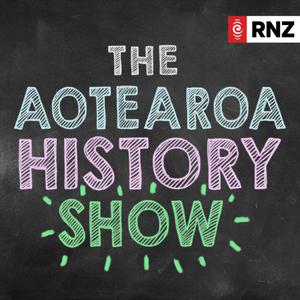
The Aotearoa History Show
RNZ
The story of New Zealand and its people from its geological origins to modern day, hosted by William Ray, Māni Dunlop & Leigh-Marama McLachlan, with animation by Chris Maguren.
- 34 minutes 26 secondsNew Zealand's Pacific Empire
New Zealand has had some big ambitions in the Pacific and mixed relations with our neighbours.
Watch the video version of the episode here
Through much of the 19th century NZ politicians and administrators dreamed of running a vast empire in the Pacific. Parts of that dream came true - although for some, it was more like a nightmare.
Today, Aotearoa has fewer Pacific possessions that it once had, but the history of our attempts at colonial expansion has effects which continue to reverberate throughout the Pacific.
In this episode we discuss:
- Where the idea of a NZ run Pacific Empire came from.
- How competition with France contributed to the push for NZ to colonize other pacific islands.
- Why British authorities were often reluctant to go along with the plan.
- How NZ eventually came to control Samoa, Cook Islands, Niue, and Tokelau.
- The 1918 flu outbreak in Samoa and the rise of the Mau movement.
- Samoan resistance to NZ control, including the "Black Saturday" killing of Samoan protesters by NZ police.
- The killing of Cecil Hector Larsen in Niue.
- Decolonisation and independence of some of NZs Pacific territories post WWII.
For more on this subject:
- Boyd, Mary. 'New Zealand and the other Pacific Islands.' In The Oxford illustrated history of New Zealand,
- Crocombe, Ron. Pacific neighbours: New Zealand's relations with other Pacific islands.
- Henderson, John. 'New Zealand and Oceania.' In New Zealand in world affairs IV, 1990-2005.
- Howe, K. R., Robert C. Kiste, and Brij V. Lal, eds. Tides of history: the Pacific Islands in the twentieth century.
- Ross, Angus. New Zealand aspirations in the Pacific in the nineteenth century.
- Salesa, Damon. 'New Zealand's Pacific.' In The new Oxford history of New Zealand.
- NZ and the Pacific Islands - Te Ara
2 October 2022, 4:00 pm - 30 minutes 25 secondsWhy isn't New Zealand part of Australia?
It seems an almost heretical question, but it’s gotta be asked! Why are NZ and Australia different countries? You might be surprised to know that we did consider joining up with our mates across the Tasman back in the late 19th/early 20th century, but it never worked out. And that’s just a small fragment of the fascinating history of our Trans-Tasman relationship with our mates across the ditch.
Watch the video version of the episode here
It seems an almost heretical question, but it's gotta be asked! Why are NZ and Australia different countries?
You might be surprised to know that we did consider joining up with our mates across the Tasman back in the late 19th/early 20th century, but it never worked out.
And that's just a small fragment of the fascinating history of our Trans-Tasman relationship with our mates across the ditch.
In this episode we discuss:
- How colonies in Australia became hubs for trade with Māori in Aotearoa.
- The different attitudes of Europeans towards indigenous New Zealanders and Australians.
- How the colony of New Zealand grew out of New South Wales.
- The early trans-tasman connections of New Zealand colonists.
- How the colonies of Australia Federated into the Commonwealth of Australia and why New Zealand didn't join up.
- The story of the Anzacs, and tensions between the NZ and Australian Governments during WWII.
- How NZ and Australia came together through military and trade agreements in the second half of the 20th century.
For more on this subject:
- The Prickly Pair by Denis McLean
- A Destiny Apart by Keiieth Sinclair
- Remaking the Tasman World by Philippa Mein Smith
- Te Ara Encyclopaedia - Australia and New Zealand
22 September 2022, 10:08 pm - 32 minutes 46 secondsWomen's Suffrage
NOTE: This episode has been reuploaded to correct some inaccuracies in the original version. We all know New Zealand was the first country in the world where women could vote. But do you know how we got there? The path to suffrage is littered with alcohol, hidden heroes & dirty tricks.
Watch the video version of the episode here
NOTE: This episode of The Aotearoa History Show has been re-uploaded to correct some inaccuracies in the original version. These changes are as follows:
A segment referring to an effort by anti-suffrage MPs to exclude Māori women from suffrage has been removed. It appears those MPs were not actually serious about implementing this change to the bill.
A segment saying Premier Richard Seddon "opposed suffrage" and acted deliberately to sabotage it has been revised to reflect a degree of uncertainty among historians about Seddon's views of suffrage.
A line saying 19th century European women were the "property" of their husbands or fathers has been removed. Women were often treated as property but were not legally defined as such.
Various changes have been made to segments referring to Kate Sheppard and the WCTU to include a perspective among some historians that the WCTU's role in the suffrage campaign was less central than previously understood.
A number of small corrections have been made to places and dates.
On 19 September 1893 Aotearoa became the first self-governing country in the world where women could vote.
So... How did it happen? Well that's a wild ride from the French Revolution, through the colonisation of Aotearoa, to battles over booze, to ultimate victory. …
18 September 2022, 5:00 pm - 31 minutes 54 secondsNumber 8 Wire
New Zealanders like to think we have a "Number 8 Wire Mentality" - a rough and ready enthusiasm for fixing and building stuff with limited resources.
New Zealanders like to think we have a "Number 8 Wire Mentality" - a rough and ready enthusiasm for fixing and building stuff with limited resources.
From the first Māori arrivals who worked out how to grow tropical plants in our cold, wet climate - to modern scientific breeding and robotics, New Zealand agriculture has always been at the cutting edge.
Watch the video version of the episode here
But innovation isn't always good news for all people, or for the environment - so in this episode we dig into the history of New Zealand agriculture through the lens of innovation.
In this episode we discuss:
- How Māori worked out which native New Zealand plants were edible.
- How Māori managed to grow tropical plants like kūmara in New Zealand's cold and wet climate.
- New Zealand innovations in sheep breeding and shearing - including the violent disputes over wide shearing combs in Australia.
- New Zealand's embrace of topdressing, and the devastating impacts of phosphate mining in Nauru.
- A whole lot more!
For more on this subject:
- Making a New Land edited by Eric Pawson & Tom Brooking
- Three Steel Teeth by Mark Filmer
- Farming Inventions - Te Ara Encyclopaedia
11 September 2022, 5:00 pm - 25 minutes 25 secondsNZ Railways
From a standing start of little tank engines chugging along wooden rails, New Zealand built a vast rail network, made up of enough steel rail to wrap halfway around the moon.
All aboard for a voyage into the history of New Zealand's railways!
From a standing start of little tank engines chugging along wooden rails, New Zealand built a vast rail network, made up of enough steel rail to wrap halfway around the moon.
If our rail network was once so massive, why is it now a shadow of its former glory?
In this episode we discuss:
- How Māori originally travelled overland in Aotearoa.
- The development of railways in the UK and the impact they had on society.
- Early efforts at building short railways in New Zealand.
- Premier Julius Vogel's massive expansion of the rail network.
- The importance of rail for New Zealand's economy, education, politics and culture.
- The challenges and opportunities rail created for Māori.
- The lives of those who built and maintained the rail network.
- The replacement of rail with automobiles and aircraft.
- Arguments over the return of rail
For more on this subject:
- Can't Get There From Here by Andre Brett
- Trainlands by Neill Atkinson
- Te Ara Encyclopaedia - Railways
4 September 2022, 5:00 pm - 30 minutes 26 secondsWhaling & Sealing
Marine mammals were a source of food and clothing for Māori and Moriori, and valuable oil for Europeans. Hunting them brought cultures together, made fortunes and cost lives but today it's saving them that unites people.
"Thar she blows!"
"Whales to starboard!"
Marine mammals have played a vital role in the history of Aotearoa. Māori and Moriori hunted seals in huge numbers for food and clothing, and many non-Māori were drawn to these shores to harvest the skins and oil of seals and whales. The arrival of these new sealers and whalers would have enormous impacts, and not just on the animals they hunted...
In this episode we discuss:
- Māori and Moriori hunting of seals and beliefs about whales.
- The hardships experienced by early non-Māori sealers.
- How sealers and whalers interacted with Māori, including the burning of the Boyd, the "Sealers War", and the role of so called "Pākehā Māori".
- The various methods and techniques used by 19th century whalers.
- What whale and seal products were used for.
- How international events, such as the Napoleonic Wars, affected the whaling trade in New Zealand and the rest of the Pacific.
- The role Māori played in whaling.
- The rise of the modern environmental and anti-whaling movements.
For more on this subject:
- The Old Whaling Days: a History of Southern New Zealand From 1830 To 1840 by Robert McNab
- Te Ara Encyclopaedia - Whaling
- Te Ara Encyclopaedia - Sealing
28 August 2022, 5:00 pm - 32 minutes 31 secondsThe Musket Wars
These are the wars that cost more lives than any other in our history. Stretched over more than a decade & the entire country, these conflicts changed Māori warfare & much of what came next.
For more than 30 years Aotearoa was beset by warfare as Māori hapū and iwi made use of new gunpowder weapons to settle old disputes with rivals. It's estimated 50 thousand people were directly affected - killed, injured, enslaved, or forced to migrate from traditional lands.
Watch the video version of the episode here
These conflicts had a massive impact on everything from the Treaty of Waitangi, to the battles of the New Zealand Wars.
These days they are most commonly known as The Musket Wars.
In this episode we discuss:
- The Battle of Mātakitaki.
- The story of Hongi Hika, and how the musket wars began, then spread around Aotearoa.
- How concepts of utu and mana influenced the wars.
- How Māori were able to make peace after conflicts.
- The debate over the importance of muskets to the conflict compared to the importance of potatoes.
- How practices like kai tangata (cannibalism) and mokomokai (the taking and preserving of human heads) were involved in these conflicts.
- How the Musket Wars influenced the signing to The Treaty of Waitangi and He Whakapūtanga (The Declaration of Independence).
- How the Musket Wars influenced British colonisation, and the New Zealand Wars.
- How and why the Musket Wars ended.
For more on this subject:
- The Forgotten Wars by Ron Crosby.
- Hongi Hika: Warrior Chief by Dorothy Ulrich Cloher.
- Making Peoples by James Belich.
- Musket Wars - Te Ara Encyclopaedia
21 August 2022, 5:00 pm - 32 minutes 13 secondsMoriori
Moriori are the original people of Rēkohu (aka Chatham Island or Wharekauri) & they have a tragic and inspiring story. Unfortunately, that story's often been twisted into, well, utter rubbish.
Moirori history has often been twisted out of shape over the years, much like some of the trees on Rēkohu bending in the strong winds. The stories of these remote islands and the people who made their home there go back centuries, but they've been misunderstood and misinterpreted for nearly as long.
Watch the video version of the episode here
Moriori are not the first people of New Zealand, they weren't forced out by Maori and they aren't extinct. In fact, we've worked closely with the Hokotehi Moriori Trust on this episode, drawing on their oral traditions as well as our own thorough, independent research.
What emerges is a story that challenges what many New Zealanders have been told and leaves some hard questions. But at its centre is a centuries-long commitment to peace and non-violence that has had a profound influence far beyond Rēkohu's wild shores.
In this episode we try to set things straight by explaining:
- How Moriori first arrived in Rēkohu.
- How Moriori adapted to the harsh conditions of their home.
- The development of Nunuku's law of peace.
- Some details of Moriori life, culture, and religion.
- The first arrival of European explorers.
- The impact of European sealing gangs.
- The invasion of Ngāti Mutunga and Ngāti Tama in 1835.
- The killing and enslavement of Moriori by these iwi
- How New Zealand colonial authorities responded (or failed to respond) to the enslavement of Moriori.
- The efforts of Hirawanu Tapu and others to reclaim Moriori land, and preserve Moriori history and culture.
- The impact of Moriori philosophy on the pacifist Parihaka movement.
- The origins of myths of Moriori as the "first" people of Aotearoa, and why they became popular.
- The modern revival of Moriori culture.
For more on this subject:
- www.moriori.co.nz
- Moriori YouTube Channel
- Moriori language app
- Moriori: A People Rediscovered by Michael King
- Moriori Deed of Settlement
- Moriori - Te Ara
12 June 2022, 5:00 pm - 33 minutes 57 secondsNative Land Court
In 1841 a few tiny islands of Pākehā settlement existed in an ocean of Māori land. Today, that picture has reversed & Māori own a fraction of Aotearoa. A big part of the reason? The Native Land Court.
Large chunks of land changed hands through the Native Land Court; or as it was also known: Te Kooti Tango Whenua - The Land Taking Court. Created by the 1862 Native Lands Act, the court was meant to establish individual land ownership under the new British colonial government. In practice it began a process of land alienation for Maori that continued until the 1990s.
Watch the video version of the episode here
In this episode we discuss:
- The right of preemption and the large crown land purchases in the 1840s and 50s.
- How these purchases contributed to increasing Māori opposition to land sales.
- How Māori opposition to land sales contributed to the New Zealand Wars.
- The different ways Māori and Pākehā thought about land.
- How and why the court was first established.
- The racist attitudes of some judges and officials.
- The impact of the "1840 rule" and the "10-owners rule", including the sale of the Heretaunga block.
- How debt was used to ensnare Māori in the court.
- The negative impacts of attending court on Māori.
- How Māori attempted to reform or remove the court in the 19th century, including the efforts of the Kotahitanga movement.
- The efforts of Māori MPs to slow down the loss of Māori land in the early 20th Century.
- The 1965 Māori Affairs Amendment Act and how it acted as a catalyst for protest movements.
- How those movements achieved reforms, including Te Ture Whenua Māori Act.
- The ongoing impacts of the Native Land Court and attempts to address injustices.
For more on this subject:
- Te Kooti Tango Whenua by David Williams
- Illustrated History of New Zealand by Judith Binney
- Ka Whawhai Tonu Matou: Struggle Without End by Ranginui Walker
- Conquest by Contract: Wealth Transfer and Land Market Structure in Colonial New Zealand by Stuart Banner, Law & Society Review
5 June 2022, 5:00 pm - 30 minutes 58 secondsThe Gold Rushes
The discovery of gold drew tens of thousands to New Zealand in search of fortune. It was a hard life, but diggers brought mateship, fashion & egalitarian ideas that changed the country forever.
Gold! The mania for this shiny yellow metal swept all over Aotearoa in the second half of the 19th century and left the country, and many of its people, fundamentally changed.
Watch the video version of the episode here
This episode we ask:
- Māori attitudes towards gold before, and after European contact?
- What makes a gold rush happen?
- How did the New Zealand gold rush fit into the context of gold rushes overseas?
- How did the rush get started?
- Who were the diggers and what were they like?
- What was the role of women in the rush?
- How did the gold rush affect tangata whenua?
- What was the role of Chinese migrants in the gold rush, and how did Europeans respond to them?
- How did the gold rush happen in different parts of Aotearoa?
For more on this subject:
- Diggers, Hatters and Whores by Stevan Eldred-Grigg
- Finding "Te Wherro" in Ōtōkou: Māori and the early days of the Otago gold rush by Lloyd Carpenter, MAI Journal.
- Journey to Lan Yuan by Toitu Otago Settlers Museum
- Gold and Gold Mining - Te Ara
29 May 2022, 5:00 pm - 30 minutes 54 secondsEpidemics
New Zealanders have battled Covid-19 for more than two years, but if you think it's the first time disease has knocked us around, well, this one's for you. Epidemics have long been part of our story.
During the Covid-19 pandemic we've heard people say stuff like "we're living in unprecedented times"... But every time they hear that, historians get extremely annoyed! Epidemics have had a huge impact on many countries through history and New Zealand is no exception.
Watch the video version of the episode here
In this episode we dig into the history of epidemics in Aotearoa New Zealand, including:
- Why Māori were relatively free of diseases until European arrival in Aotearoa.
- The factors which helped promote the development of epidemic diseases in Europe and Asia.
- The early impacts of disease on Māori in the 19th century.
- Efforts by colonial authorities to reduce the impacts of disease on Māori, and how these efforts were linked to a goal of "assimilating" Māori into European culture.
- Efforts by Māori to reduce the impact of disease.
- The development of sanitary infrastructure and its impact on epidemic disease.
- The 1918 flu pandemic.
- Polio epidemics in the 20th century.
- The impact of modern medicines, including vaccines.
For more on this subject:
- The Healthy Country? A History of Life and Death in New Zealand by Alistair Woodward and Tony Blakely
- Black November by Geoffrey Rice
- Dirt: Filth and Decay in a New World Arcadia by Pamela Janet Wood
- Epidemics - Te Ara
22 May 2022, 5:00 pm - More Episodes? Get the App
Your feedback is valuable to us. Should you encounter any bugs, glitches, lack of functionality or other problems, please email us on [email protected] or join Moon.FM Telegram Group where you can talk directly to the dev team who are happy to answer any queries.
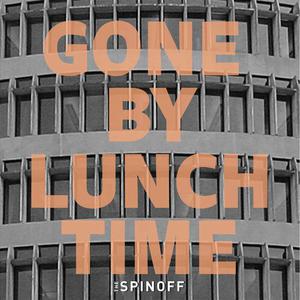 Gone By Lunchtime
Gone By Lunchtime
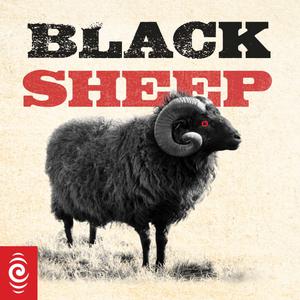 Black Sheep
Black Sheep
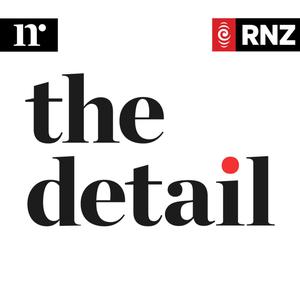 The Detail
The Detail
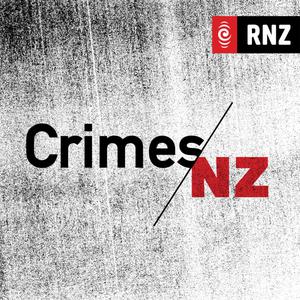 Crimes NZ
Crimes NZ
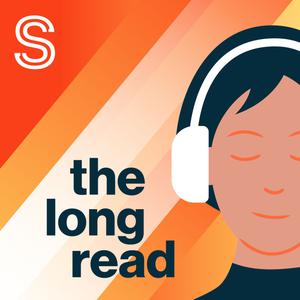 The Long Read from Stuff
The Long Read from Stuff
 Saturday Morning
Saturday Morning